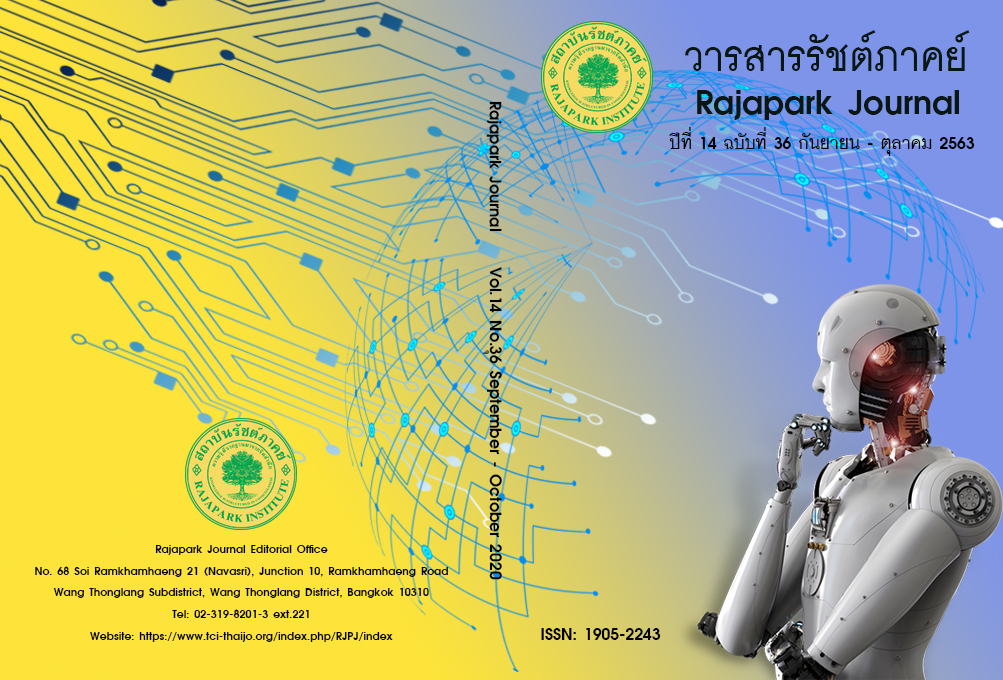The Efficiency of Online Marketing Communication by Using Celebrities on the Influence of Consumer’s Intention buy Dietary Supplements Product
Main Article Content
Abstract
This present study aimed to explore the efficiency of online marketing communication by using celebrities that influenced the consumer’s intention to purchase dietary supplement products. A set of questionnaires validated (0.8607) by experts was utilized to collect data from 400 respondents having experience in buying online products. The statistics used for data analysis included frequency, percentage, mean, standard deviation, and multiple regressions. The results of data analysis found that a majority of consumers were single female, age between 26-33 years old, employed in private companies, received education lower than a bachelor’s degree, and gained an approximate income of 10,000 – 20,000 per month. The results of hypothesis testing found that the efficiency of online marketing communication by using celebrities influenced consumer’s intention to purchase dietary supplement products at a statistical significance of 0.05. Considering each aspect, building the brand relationship, purchasing motivation and brand royalty influenced the intention to purchase the products at a statistical significance of 0.05. The overall finding revealed that the efficiency of online marketing communication promoted by celebrities was consistent with the intention to purchase dietary supplement products of customers.
Article Details
Views and opinions appearing in the Journal it is the responsibility of the author of the article, and does not constitute the view and responsibility of the editorial team.
References
Anekthammakul, P. (2010). Effects of using multiple product (celebrity) in advertising. Master's Degree in Personal Education, Thammasat University.
Bovee, C. L., & Thill, J. V. (1995). Excellence in Business Communication (3rd Ed.). New York: Mcgraw-Hill.
Chaitaweewutikul, S. (2012). Consumer’s Buying Behavior of Goods and service in Group-Buying Program of Ensogo Website in Bangkok Metropolis. Master of Business Administration Degree in Marketing. Srinakharinwirot University.
Hirankitti, P., Mechinda, P., & Manjing, S. (2009). Marketing Strategies of Thai Spa Operators in Bangkok Metropolitan. Paper presented at The International Conference on Applied Business Research ICABR Valletta (St.Julians)–Malta.
Howard, J. A. (1998). Consumer behavior in marketing strategy. New York: Prentice Hall.
Kasikorn Research Center, (2017). Stick to the trend of healthy products Create business opportunities. Retrieved February 20, 2019, from https://kasikornbank.com/en/business/sme /KSMEKnowledge/ article/KSMEAnalysis/Documents/HealthyProduct.pdf
Nawanno, N. (1999). Consumer involvement, advertising responses and purchase intention for male personal care product. Master of Arts in Advertising. Faculty of Communication Arts, chulalongkorn University.
Peterson & Plowman. (1953). Business Organization and Management. Illinois: Irwin.
Terason, S. (2016). Marketing communication (4th ed.). Bangkok: Chulalongkorn University Press.
Vanichbuncha, K. (2007). Research Statistics (3rd ed.). Bangkok: Chulalongkorn University.
Wuttimahanont, M. (2013). Factors Relating to Consumer's Purchasing Behavior through E-Commerce Websites. (Master of Business Administration). Faculty of Commerce and Accountancy, Thammasat University.
Yamane, T. (1967). Elementary sampling theory. Englewood Cliffs, NJ: Prentice-Hall.


